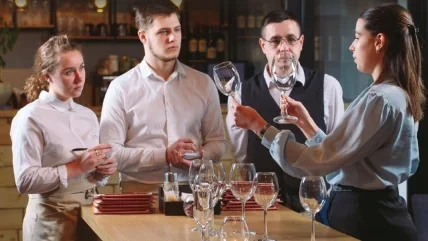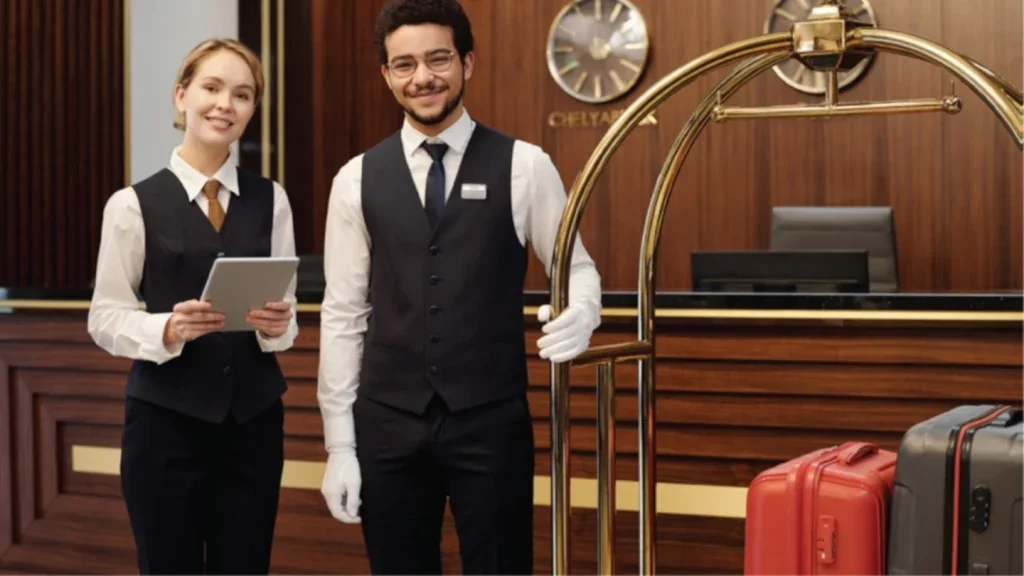
Earlier this year, at our professional development graduation ceremony held at The Savoy, London, I had the privilege of watching the most recent cohorts of HOSPA learners celebrate the successful completion of their studies. It was an occasion filled with pride and optimism, with a clear sense of progression – not only for the individuals receiving their certificates but for the industry as a whole.
It was also a moment for reflection. Our president, Harry Murray MBE, delivered a powerful speech that underscored the importance of learning and upskilling in hospitality. His message was clear – that the sector is changing rapidly, and those who continue to develop professionally are best placed to thrive in the years ahead. This is a message that resonates deeply with me. Hospitality is one of the most dynamic, rewarding and, at times, demanding sectors in the economy. It attracts people who are naturally driven and empathetic but also resilient. However, it’s no longer enough to simply rely on passion or experience. As our operating environment becomes more complex, and the pace of change accelerates, continuous professional development is what ensures we remain competitive and capable, as well as confident in ourselves.
A changed industry
Anyone who has spent time in hospitality over the past five years will recognise the sheer scale of change we’ve had to adapt to. Brexit fundamentally altered the labour market and the movement of goods, while the pandemic devastated revenues and changed guest behaviours in ways we are still trying to understand. Energy and other costs have risen sharply, supply chains are less reliable and the cost-of-living crisis continues to impact customer spend. Geopolitical factors – not least the ongoing war in Ukraine – have created uncertainty across the global economy.
Amid these difficulties, however, we’ve also seen remarkable resilience and innovation. Despite the pressures, more than 400 new hotels have opened in the UK since 2018. London remains a key focus for international investment, while cities such as Manchester, Liverpool, Glasgow and Edinburgh continue to attract developers and brands. Iconic properties such as Claridge’s, The Ritz and The Savoy have received major refurbishments, underscoring investor confidence in British hospitality.
But this growth comes with expectations. Operators and investors demand returns. Brand standards must be upheld. Consumer demands have shifted. The days of ‘learning on the job’ being sufficient are disappearing. Hospitality professionals must now be equipped with formal skills in revenue optimisation, finance, asset management, technology systems and operational leadership, while also being prepared to update that knowledge continuously.
The role of formal training
This shifting landscape is why HOSPA’s programmes have never been more important. Under the guidance of our head of learning and development, Janel Clark, our online courses offer qualifications in disciplines that are fundamental to commercial success. Our approach is deliberately flexible, allowing learners to study alongside their work commitments, and our tutors – industry experts like Clark, and Yaneal Patel, Alex Slors and Michelle Wells – bring deep, real-world insight to every module.
There’s a reason why our graduates leave not only with improved skills but also with enhanced confidence and renewed motivation. The learning journey offered by HOSPA isn’t simply academic. It is a practical, career-defining experience that helps people better understand their roles to help them contribute more to their organisations and set ambitious goals for the future. As Murray mentioned in his graduation address, the courses also give learners the ability to communicate financial and operational performance more clearly. In too many businesses, key commercial data still sits in silos. Sharing it across departments – and equipping leaders at all levels to forecast and budget while reporting effectively – creates stronger, more agile operations.
Technology, AI and the changing skill set
The need for professional development is also being driven by the growing influence of technology. Artificial intelligence is starting to reshape the way hospitality functions. From chatbots and smart systems to dynamic pricing tools and predictive analytics, the applications are growing by the day. One thing we can be sure of is that people will always be a necessity in most hospitality settings. The personal, empathetic welcome smile cannot be replaced by even the most sophisticated robot. At last year’s HOSPACE conference, AI was a central topic of debate. We heard from leaders across the industry who discussed both the possibilities and the pitfalls. There’s no doubt that automation can help eliminate inefficiencies and reduce errors. In some cases, guests may even prefer the speed and simplicity that automation provides. But there’s also a clear need to maintain the emotional intelligence and discretion that defines great service.

This is where I believe the human element must remain central. The BBC recently explored the future of AI in the workplace, highlighting concerns that many jobs may be replaced or radically altered. In hospitality, we’re not immune to that trend – but we are uniquely positioned to respond. Unlike other industries, ours is fundamentally people-focused. AI can support us, but it cannot replicate the intuition and empathy that hospitality demands.
“There’s a reason why our graduates leave not only with improved skills but also with enhanced confidence and renewed motivation.”
Professionals do need to be comfortable working alongside AI systems and other forms of technology. This includes understanding how to interpret data and manage digital tools while applying insights in a way that enhances guest satisfaction. Professional development must therefore evolve to reflect this new reality, and at HOSPA we are committed to ensuring our programmes stay current and accessible and, above all, relevant.

Motivation and habit
Of course, committing to ongoing learning is not always easy. As Murray said, it takes self-discipline and clear goal setting. Many training courses are started with good intentions but never finished. That’s why we place so much emphasis on community and support. Learners are more likely to succeed when they feel connected to a shared purpose and can ask questions in a safe environment. For those who find it difficult to build a consistent learning habit, I recommend exploring frameworks like those outlined in the bestselling book Atomic Habits by James Clear. It offers practical advice on how to integrate positive behaviours into daily life, and many of our students have found it helpful in staying on track. But beyond habit, what truly drives learning is belief – in one’s own potential and in the value of the work we do. I see that belief every time I speak to our graduates. They know that professional development is more than a certificate. It is an investment in both their career and the wider industry.
The bigger picture
It’s important to recognise that when individuals grow, the industry benefits. Better decision-making leads to better financial performance; better communication creates stronger teams; greater understanding of technology leads to smarter operations. At a time when many hospitality businesses are struggling to recruit and retain staff, offering structured development opportunities can also help improve engagement and reduce turnover. There is another aspect to this as well. Hospitality is often underestimated as a career. Despite being one of the largest employers in the UK, it is sometimes dismissed as transient or unskilled and viewed as a stopgap. This could not be further from the truth. The work our members do requires serious levels of intelligence and emotional resilience, with the ability to manage complexity under pressure.
By investing in professional development, we send a clear message that hospitality is a serious, skilled profession with excellent career prospects. We help individuals progress from front-line roles to senior leadership, and we raise standards across the board. We need to do more to highlight how fantastic an industry it is that we work in.
Looking ahead
As we prepare for HOSPACE 2025, where once again we will bring together industry leaders and innovators at the Royal Lancaster London (on Thursday 13 November 2025 – save the date), professional development will be central to our discussions. Our agenda will explore the future of finance, technology, operations and the guest experience – all with the understanding that people remain at the heart of our sector. To all those working in hospitality today – whether you are starting your career, leading a department, running a multi-site operation or even heading up a global group – I encourage you to make learning a part of your routine. Seek out opportunities. Ask questions. Stay curious.
There is no finish line when it comes to personal development. As the industry changes, so must we. And as we each take steps forward, so too does the industry that we care so deeply about. Our own personal growth enriches all around us, so let’s embrace it and continue to look forward with optimism and positivity.






